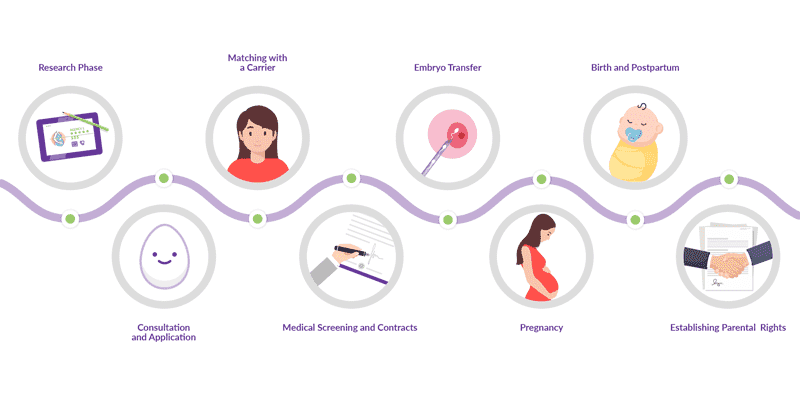Surrogacy: A Comprehensive Guide to Building Families
Surrogacy stands as an extraordinary pathway for individuals and couples to realize their long-held dreams of becoming parents. Fundamentally, surrogacy involves a woman selflessly carrying and delivering a baby on behalf of another individual or couple, affectionately known as the intended parents. This act of generosity and compassion has brought immense joy to countless families worldwide. In this guide, we’ll delve into the various aspects of surrogacy, from different types to the roles of key stakeholders, and the legal and ethical considerations involved.
Types of Surrogacies
1. Exploring Gestational Surrogacy
Gestational surrogacy is a modern marvel of reproductive technology that has revolutionized the way individuals and couples can build their families. In gestational surrogacy, commonly known as the gestational carrier process, the surrogate undertakes the role of carrying a baby who is not biologically connected to her. Instead, the embryo is created using the intricate process of in vitro fertilization (IVF), incorporating the genetic material from the intended parents.
The journey of gestational surrogacy commences with the careful selection of a surrogate who willingly commits to carrying the embryo of the intended parents to full term. Once a suitable match is identified, the process proceeds as the intended mother or an egg donor undergoes ovarian stimulation to produce multiple eggs.
Subsequently, these eggs are retrieved and subjected to fertilization with sperm from the intended father or a chosen sperm donor within the controlled environment of a laboratory. Following fertilization, the resulting embryos undergo careful monitoring and cultivation for several days to assess their viability.
Once the embryos attain an optimal stage of development, a thorough selection process identifies which embryos are best suited for transfer to the surrogate’s uterus.
This critical step marks the culmination of the IVF process, as one or more embryos are delicately placed within the surrogate’s womb, where they will hopefully implant and initiate the miraculous journey of pregnancy.
This transfer typically occurs through a minimally invasive procedure known as embryo transfer, during which the embryos are carefully placed into the surrogate’s uterus using a thin catheter. Following the embryo transfer, the surrogate undergoes close monitoring and medical care to support the pregnancy.
Regular check-ups, ultrasounds, and blood tests constitute essential components of the monitoring process throughout the pregnancy journey, serving to track progress and safeguard the health and well-being of both the surrogate and the developing fetus.
A notable advantage of gestational surrogacy lies in its capacity to enable individuals or couples to conceive a child who shares a genetic connection with them. This can be particularly important for individuals who are unable to conceive or carry a pregnancy due to infertility, genetic conditions, or other health concerns.
Gestational surrogacy offers a path to parenthood that bypasses many of the genetic obstacles that may prevent traditional conception or pregnancy. Moreover, gestational surrogacy offers a degree of separation between the surrogate and the child she bears, potentially alleviating certain emotional and legal intricacies commonly linked with traditional surrogacy arrangements.
Because the surrogate is not genetically related to the baby she carries, there may be fewer concerns about parental rights and custody issues, leading to a more straightforward and harmonious surrogacy journey for all involved. Despite its many advantages, gestational surrogacy is not without its challenges. The procedure can be intricate and costly, encompassing various medical procedures, legal contracts, and logistical factors. Additionally, finding a suitable surrogate and navigating the legal and ethical implications of surrogacy can be daunting for intended parents. However, for many individuals and couples, the opportunity to have a child through gestational surrogacy outweighs these challenges.
The chance to experience the joys of parenthood and build a family of their own is priceless, and gestational surrogacy offers a pathway to achieving these dreams for those who may not be able to do so through traditional means. Each type of surrogacy offers its own set of advantages and challenges, and the decision to pursue surrogacy should be carefully considered based on individual circumstances and preferences.
Whether through gestational surrogacy, which allows for a genetic connection between the intended parents and the child, or traditional surrogacy, which fosters a unique bond between the surrogate and the child, surrogacy offers hope and possibilities to those longing to become parents.
With the support of medical professionals, legal experts, and surrogacy agencies, individuals and couples can navigate the surrogacy journey with confidence and optimism, knowing that they are on the path to fulfilling their dreams of building a family.
2. Exploring Traditional Surrogacy
Traditional surrogacy is a less common but equally valid option for individuals and couples seeking to become parents through surrogacy. In contrast to gestational surrogacy, where an embryo is formed using the intended parents’ genetic material, traditional surrogacy entails the surrogate contributing her own egg to conceive the child.
In traditional surrogacy, the surrogate undergoes insemination with sperm from either the intended father or a sperm donor. As a result, the surrogate experiences a pregnancy in which she shares a genetic connection with the child she carries. This intimate biological connection between the surrogate and the child can create a unique and profound bond, akin to that of a biological mother and child.
While traditional surrogacy offers the opportunity for a deeply personal and emotional connection between the surrogate and the child, it also presents unique legal and ethical considerations. Because the surrogate is genetically related to the child she carries, there may be concerns about parental rights and custody issues, particularly if the intended parents are not married or if the surrogate decides to assert her parental rights after the birth of the child. Additionally, traditional surrogacy may carry a higher risk of emotional and psychological challenges for all parties involved.
The surrogate may experience conflicting emotions about relinquishing the child she carries, while the intended parents may grapple with feelings of uncertainty and insecurity about their parental role.
Despite the possible challenges, traditional surrogacy can offer a fulfilling and rewarding path to parenthood for individuals and couples who face difficulties conceiving or carrying a pregnancy by other methods.
The opportunity to have a biological connection to their child and to experience the joys of parenthood is priceless, and traditional surrogacy offers a pathway to achieving these dreams for those who may not be able to do so through gestational surrogacy or other methods.

Key Players in the Surrogacy Journey
Intended parents are individuals or couples who seek to become parents through surrogacy. They play a central role in the surrogacy journey, making critical decisions and providing emotional and financial support throughout the process. Intended parents often embark on the surrogacy journey after exploring other options for starting a family and finding surrogacy to be the best path forward.
A surrogate mother, often referred to simply as a surrogate, is a woman who carries and gives birth to a baby on behalf of the intended parents. Surrogates come from diverse backgrounds and have varied motivations for becoming surrogates. Some are driven by a desire to help others experience the joy of parenthood, while others may have personal connections to surrogacy or have had positive experiences with their own pregnancies.
Understanding the Complex world of Surrogacy Processes
Surrogacy agencies play a crucial role in facilitating the surrogacy process. These organizations specialize in connecting intended parents with suitable surrogates, providing guidance and support throughout the journey, and overseeing the legal and medical aspects of the process.




